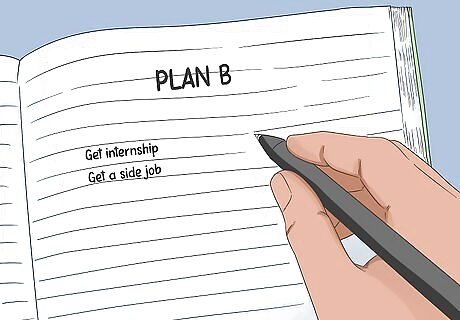
views
Accepting Defeat with Dignity

Keep your cool. You can keep your cool in a losing situation by forgiving yourself, and your teammates (if applicable). Tell yourself, "As long as I put forth my best effort, it's OK that I lost. I tried really hard, but the other person had an advantage." You can also reassure yourself that it is not the end of the world, and that there will be more opportunities for you to win.

Be sportsmanlike. If you find yourself in a losing situation, always remember to be a good sport. Don't trash talk the winner or the other team. Instead, congratulate them on a job well done. In your heart, you know that they worked as hard as you to earn that win. You can congratulate the winner by telling them, "Congratulations" and shaking their hand. You can even ask them to give you some pointers if they have time. If it was a team effort, tell your opponents, "Good game!" with a smile. If your opponent cheated, give yourself time to calm down before talking to the officials.

Think positive. Even though you lost, you're still healthy right? Try to think about all the good things that came from your journey from start to finish. Even though you lost, you still probably learned some great skills along the way. Think about your potential and how far you have come; you are definitely not the same person as you were when you started this game. If you think about these things in the moment, it is much easier to accept and be humble about your defeat.
Dealing with Defeat

Focus on the process rather than the result. Instead of looking at the whole situation as a defeat, try to look at the process and all of the work you did. Even though the outcome was not what you wanted, you can still feel proud of the little victories along the way. For example, if your team lost a big game, then think back on all of the things that you accomplished on your way to that big game or even during that big game. Did you play well together? Score difficult goals? Or give your best effort? These are all things to be proud of.

Let yourself be upset, but set limits. When dealing with defeat for the first, second, or third time, it is OK to feel bad. This is normal. If you feel like crying, then cry. If you feel anger, let yourself be mad. However, it is important to set limits on your feelings. For example, it is OK to feel bad for a day or two, but don’t wallow in your sorrows for a week or two. It is important to acknowledge your mistakes, and to get back on your feet as soon as possible. If you need to, call a friend or family member to talk it out. Often times, talking it out will help you realize where you went wrong, and you will be able to find ways to improve your mistakes.

Don’t let defeat define you. You may experience a time in your life where it seems as though defeat is never ending. But don’t let little defeats define who you are. Remember that the real game is you against yourself. If you let yourself give up, this is the real defeat. Tell yourself that you will try again, and put forth your best effort. If you are not going to put forth your best effort, then it is not worth it. Always be willing to adjust your definition of success. You might not always be able to be the fastest runner; instead of making coming in first your goal, perhaps consider simply trying to beat your personal record.

Take responsibility. When handling defeat, always take responsibility for it. Do not act like the world owes you something. Do not blame your coworker, the economy, or the competition for your failure. The sooner you can accept your defeat as your responsibility, the sooner you will be able to learn from your mistakes and move on. For example, perhaps you had too much on your plate and were not able to put forth your best effort. Or, maybe you didn’t assess your competition accurately. Whatever the problem was, take responsibility for it.
Deciding to Move Forward

Learn to see opportunity in your defeat. Although it is hard to see at first, there is opportunity in every defeat. By assessing what went wrong, you can learn valuable lessons that will prevent you from making the same mistakes. Reflect on the situation and look for opportunities to improve in the future. Try asking yourself questions like, "Where are my opportunities for improvement?" or "What knowledge have I gained as a result of this process?" Perhaps the defeat will reveal that you were meant to do something else, or that you wanted it for the wrong reasons. Remember that tomorrow is always an opportunity to begin anew.

Look for guidance. When something doesn’t go as planned, look for guidance from an expert in your field. If you have a mentor, speak to your mentor about what went wrong, and about the ways you can fix the issue. You can also look into blogs, social media, or discussion boards for advice and support. Remember that you are a student who is always learning and improving.

Continue to work at and do the things you love. You can deal with your defeat by continuing to work at and do the things that give your life meaning. For example, if you blog, continue to blog. You can even blog about your experiences with defeat. This way you can help yourself, as well as other people who are experiencing the same thing. If you enjoy volunteering, volunteer for your favorite charity. The point is to not let defeat ruin other opportunities that might be available to you.
Looking to the Future

Reaffirm your goals. Keep moving forward by setting goals. Identify the next steps you will take to achieve your goals. For example, if your goal is to get into graduate school, mark on your planner when you plan to have your personal statements written, your recommendation letters sent out, and the application completed. By setting goals, you can keep your mind off of defeat, and stay focused on the future.

Develop back-up plans. Don’t assume that you will win or be successful. Over-confidence can lead to defeat just as often as not being well prepared. You can buffer yourself from defeat by having back-up plans. For example, have your main plan, i.e., getting into graduate school. But if you don’t get accepted into a graduate program of your choice, keep a couple of job opportunities or internships in mind just in case.

Believe in yourself. If you believe in yourself, and are passionate about what you do, there is no such thing as defeat. Always remember to keep a positive mind set. Identify negative self-talk such as, “I’m not good enough” or “I can’t do it.” Reverse this negative self-talk by telling yourself, “I can do it, I have done it before, and I will do it again.” Take time to reflect. Reflect on previous situations in your life where, against all odds, you pulled through and made something happen. They can be as small as making the basketball team or as big as landing a job. By remembering these instances, you will be able to pool your inner resources, and find the strength to do it again.

Get outside help. If you cannot find the inner strength to refocus, don't hesitate to ask for help. Contact a mentor, a friend, a family member, or a therapist. Tell them that you are having a hard time focusing or refocusing on your goals. Review with them what happened, and what you want your new goals to be. Make a list of the goals that you would like to accomplish in the next week or month. Try to start out small so that you can accomplish these goals and feel better about your situation. For example, one of your goals could be to look for and read books about how to bounce back after you have experienced a major defeat.

















Comments
0 comment